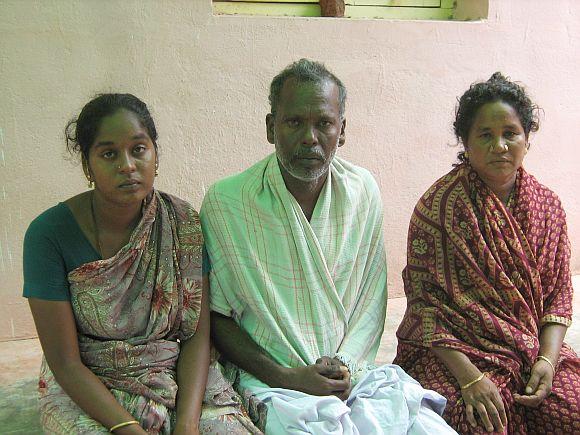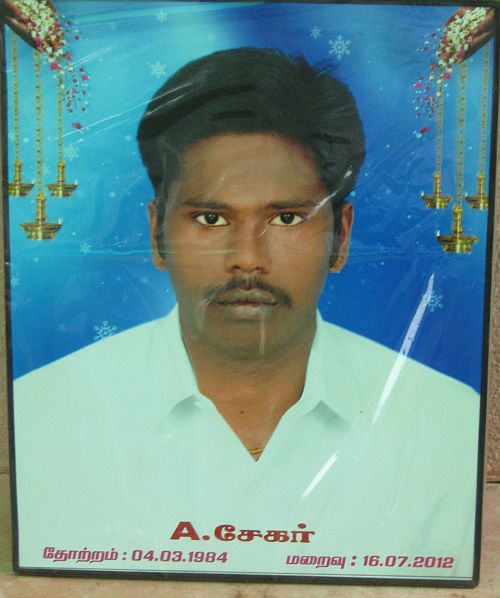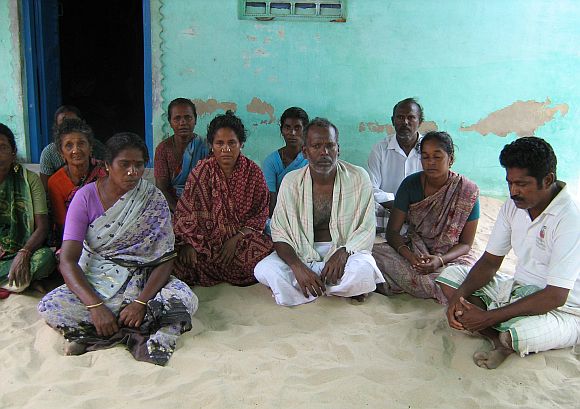
For fisherman A Sekar's grieving parents in a coastal village in Tamil Nadu, no answers are forthcoming as to why their son's tiny fishing boat was fired upon by the US navy off Dubai. A Ganesh Nadar reports from Thoppuvalasai on the tragedy
Tears well up in Nagavalli's eyes as she poses for a photo. She tries hard to wipe them away, but they continue to roll down her face.
The tragedy that came her family's way has left her numb. Her 27-year-old son, A Sekar, fell to bullets fired by US naval ship Rappahannock at his fishing boat off the Dubai coast on July 17.
When the wooden coffin arrived at their home in Thoppuvalasai in Ramanathapuram district of Tamil Nadu at 9.20 pm on Wednesday, the world crashed around the family. Sekar's mother fainted at the sight of her son's lifeless body while his sister Ramalakshmi broke down. His father, M Arumugam, maintained a stoic silence throughout.
Twenty minutes later, Sekar's body was buried.
Thoppuvalasai is 20 km off the Ramanathapuram-Rameswaram highyway, and finding it is no easy task. It's at the end of nowhere, along the Palk Strait. It's hard to imagine that the illiterate Nagavalli would have even heard of the United States, but here she was, blaming the sole superpower for murdering her son. The fishermen in Thoppuvalasai too are unwilling to buy the US justification that it shot at Sekar's boat in self-defence. They wonder how the mightiest navy in the world could get scared of a small fishing boat, and why.
...

After completing his class 10 exams, Sekar joined an industrial training institute to study electrical engineering. But he left it a year later as Arumugam was unable pay the fee and went on to join his father, who went fishing in his catamaran.
For a decade, father and son toiled hard.
Their hut was ravaged in the 2004 tsunami after which the government provided them with a concrete house.
They had to take a loan for Ramalakshmi's wedding. When Sekar realised that the income from their fishing boat would not be sufficient to pay off the loan he decided to take up a job in the Gulf, like many fishermen from his village had done.
Armugam borrowed another Rs 80,000 to get Sekar a visa, ticket and medical certificate to go abroad.
...

The agent had promised a salary of Rs 10,000 plus expenses. But Sekar only sent home Rs 5000. He used to complain to his father over the phone that the work was very hard, food was bad and that they were not getting the promised salary.
Ten months on, Sekar wanted to leave but the Arab employer refused to return his passport. The employer did return it eventually, when the Dubai authorities wanted to send Sekar's body back home.
Neither the Governments of India or Dubai or Sekar's employer bothered to reach out to the bereaved family, they say.
The Tamil Nadu government, which eventually announced a solatium of Rs 5 lakh for Sekar's family, too came under fire from the fishing community in Thoppuvalasai.
Comparing the Kerala government's efforts to secure Rs 2 crore in compensation from Italian marines who had shot a fisherman, villagers lamented the state government's inability to secure a similar deal from either the United States or Sekar's employer. What does the Kerala government have that we don't, they ask.
Says a depressed Nagavalli, "I sent my son to earn money; he has earned me Rs 5 lakh. All my debts are paid. What he could not do when alive, he has done with his death."